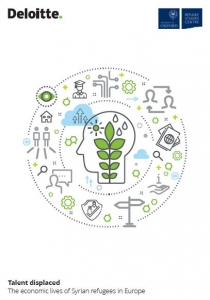alt=""
Credit: UNHCR/Agata Wozniak
Syrians in Europe
In collaboration with Deloitte and a number of NGO partners, we have undertaken preliminary data collection examining the economic lives of Syrian refugees in Austria, the Netherlands, and the United Kingdom. Based on a relatively small survey of 305 Syrian refugees, as well as qualitative interviews with refugees and businesses in these countries, the research focused on the barriers to refugee employment.
The report that emerges from the work is entitled Talent Displaced: the Economic Lives of Syrian Refugees in Europe. The survey presents a paradox: a significant number of refugees surveyed are highly educated and skilled; 38% have university education, and one-third were employed in either skilled work or the professional services industry in Syria. However, the majority of the respondents (82%) were unemployed.
On the refugee side, three main factors stand out as explaining this paradox:
- Language: although governments offer language training it is often inadequate to prepare refugees for work.
- Skills: often refugees lack adequate training or qualifications recognition to be competitive in the labour market.
- Incentives: government policies often leave refugees concerned that seeking work may jeopardise their access to support.
Many of the businesses interviewed were open to the idea of hiring refugees, but seek legal and regulatory guidance around employing them. Additionally, many had misconceptions relating to their potential as prospective employees.


